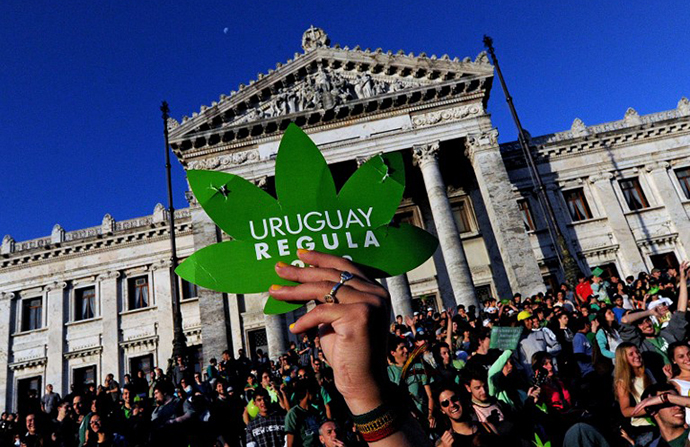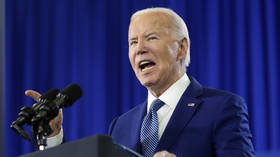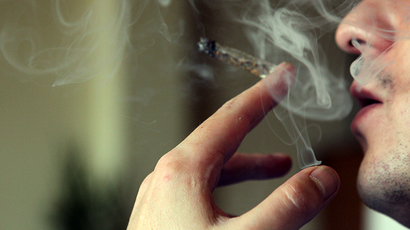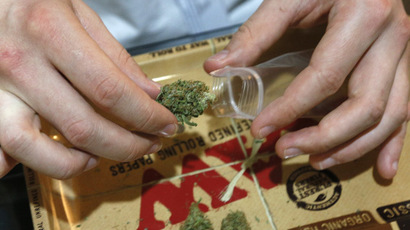Legalizing cannabis poses grave danger - UN

The International Narcotics Control Board (INCB) has called changes to cannabis laws in Uruguay and the US a ‘very grave danger to public health’, but campaigners for reform to drugs laws say the INCB’s comments are ‘shortsighted and narrow minded.’
The annual report by the INCB, published on Tuesday,has said changes to legislation in Uruguay, and the US states of Colorado and Washington are ‘misguided initiatives’ that fail to comply with the 1961 international narcotics convention.
On November 6, 2012, Colorado became the first state in the world to vote in favor of ending cannabis prohibition by a majority of 55%. Under the law, cannabis consumption is permitted in a manner similar to alcohol with equivalent offences for driving stoned as driving drunk. Back in 2000 Colorado state lawmakers authorized patients and their caregivers to use marijuana in limited amounts.
The report by the INCB says that the introduction of the medical cannabis access program in Colorado has led to an increase in cannabis-related treatment admissions as well as car accidents where the drivers were under the influence of marijuana
“Drug-traffickers will choose the path of least resistance, so it is essential that global efforts to tackle the drug problem are unified. When governments consider their future policies on this, the primary consideration should be the long-term health and welfare of the population,” said Raymond Yans, the INCB president in a statement.
The warning by the INCB follows a vote by Uruguay’s parliament last December to approve a bill to legalize, as well as regulate the sale of Marijuana.
Jose Mujica, Uruguay’s president, has said that the legislation was an attempt to find an alternative to the so-called war on drugs, which he said had caused more problems than it has solved.

While in the US, Colorado voted to allow recreational pot sales in a ballot initiative in the November-2012 general election, as did voters in Washington state. Activists in Alaska, Oregon and Nevada hope their states will be next.
The INCB report warns against what it calls ‘alternative drug regimes’ and argues that legalizing cannabis will not lead to a reduction in underground markets but instead will lead to higher levels of addiction.
But this view is heavily criticized in a press release by the Transnational Institute (TNI), a think tank for progressive ideas, and the Global Drug Policy Observation designed to coincide with the release of the INCB report.
They admit that changes to the law in Uruguay, Colorado and Washington have already caused breaches to the UN drug’s control regime, which has focused almost totally on prohibition, but that the INCB and the UN are not being realistic about the problem.
“Rather than seek to learn from or understand the growing political support for alternative drug policies, the UN apparatus – and particularly the INCB – has responded mainly with shortsighted hostility and narrow minded rejectionism,” the press release reads.
A report by the TNI and the Global Drug Policy Observation to be released mid-March will say that the 1961 Single Convention on Narcotic Drugs was inaccurate even when it was drafted over 50 years ago. Labeling Cannabis as a psychoactive drug with ‘particularly dangerous properties’ was the result of questionable decision-making and dubious political compromises with little scientific backing.
As well as changes to the law in Uruguay and the US, countries such as India, Spain and the Netherlands are stretching the inbuilt legal flexibility in the 1961 Convention to its limits by in effect decriminalizing marijuana. This is why fundamental reform of the UN’s outdated drug control system can no longer be avoided.
“We are at a tipping point now as increasing numbers of nations realize that cannabis prohibition has failed to reduce its use, filled prisons with young people, increased violence and fuelled the rise of organized crime. We need the US to open an honest dialogue rather than close their eyes and indulge in blame games,” said Martin Jelsma of the TNI.
The INCB report compares cannabis consumption to the rather different history of alcohol and tobacco markets. It says that despite cigarettes being legal there is still a thriving black market for them in many countries, and cites Britain, where cigarettes are heavily taxed and are therefore relatively expensive, where 20 percent of the domestic cigarette market is bootlegged and Canada where its 33 percent.
The report then says that despite alcohol being legal, it is responsible for two million arrests in the US compared to 1.6 million because of illegal drugs, even though alcohol is well known to cause violent behavior in many people when it is abused.
The INCB also voices its concerns about the huge growth of illicit poppy cultivation in Afghanistan, which grew by 36 percent last year reaching 209,000 hectares.
It also warns about the rapid increase of so-called legal highs, which are growing in popularity in the developing and developed world and have led to a number of deaths and accidents. It further expresses concern about the abuse of prescription drugs in the US.














